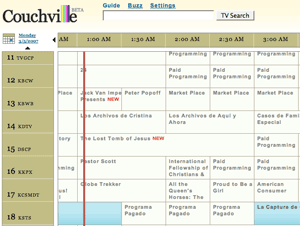Couchville - Traditional TV Meets Web 2.0
Wednesday, August 22nd, 2007![]() I’ve seen my fair share of useless web 2.0 start-ups lately. Give me something I can actually use. Couchville is that something. It is very rare and refreshing when a new service comes along and surprises with a stunning experience.
I’ve seen my fair share of useless web 2.0 start-ups lately. Give me something I can actually use. Couchville is that something. It is very rare and refreshing when a new service comes along and surprises with a stunning experience.
I had no expectations from a service that offers TV listings. After all, TV is so old school, right? Wrong. Couchville has done an excellent job of incorporating new-web technology with traditional media to create a wonderful experience. Couchville quietly launched in February 2007. Only recently has it come to my attention. Simply put, Couchville offers dead simple TV listings - and I mean that.
When you hit the site, you are prompted to enter postal code (or zip code) and your satellite/cable provider to create a personalized grid.
The viewing experience is phenomenal. An uncluttered, intuitive interface displays only the necessary functionality without any useless features. The AJAX viewing grid can smoothly be dragged to a desired viewing period without the need for a page refresh. Your arrow keys can also be used to navigate through channels. An explicit red time bar clearly indicates current TV listings in your area. Surprisingly, only a few subtle text ads appear on the page.

Click here for a full screenshot: Couchville screenshot.
Here are some of the other useful features offered:
- Users can hide channels they don’t want to see, creating a customized viewing experience.
- An AJAX calendar function allows you to quickly and easily viewing listings for other days or months.
- Users can add shows to their favourites for easy tracking.
- A buzz chart tracks what is hot from the previous week.
- The site provides background info and descriptions for each show, as well as a permanent link for easy access.
- The search function autocompletes your query, requiring you to only type a few letters.
- A drop-down menu quickly allows you to jump to any channel.
I was actually surprised at how fast the site operated as well. Kudos to the Couchville team. I guess I just can’t say enough good things about the service. I would highly recommend that anyone who checks TV listings check out Couchville. You will not be disappointed.
Couchville has succeeded at doing ONE thing very well - that being TV listings, obviously. Their strategic focus must be applauded. Too many companies have been caught trying to be everything to everyone. These companies got killed.

